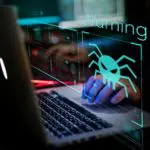Imagine a security guard testing your castle’s defenses, not to steal your treasure, but to find weak points and make it stronger.
That’s the essence of CEH ethical hacking, where skilled professionals launch simulated cyberattacks -with permission-
This article will be your guideline to be a certified ethical hacker, as you will know what ethical hacking is, the importance of ethical hacking, the main types of ethical hacking, and the requirements you should be aware of before learning ethical hacking.
What Is Ethical Hacking?

Ethical hacking, also known as penetration testing or white-hat hacking, is like playing defense in the digital world.
If you are an ethical hacker you will use the same tools that malicious hackers might employ, but with a legal method.
The main purpose of CEH ethical hacking is to improve organizational security by unearthing hidden weaknesses.
You as an ethical hacker employ various tools and techniques that mimic those used by malicious actors. You will conduct thorough scans of systems and networks, searching for exploitable vulnerabilities. These might include:
- Unfixed software: any software might have a security vulnerability that hackers can take advantage of, Ethical hackers identify these vulnerabilities and fix them promptly.
- Misconfigurations: Incorrect system configurations can create security gaps. Ethical hackers discover these misconfigurations and recommend appropriate adjustments
- Poor passwords: Simple passwords are easily cracked. Ethical hackers attempt password cracking to expose the need for stronger password policies.
So, CEH ethical hacking equips individuals with the skills to ethically exploit vulnerabilities, while the overall purpose is to improve the security posture of organizations and make them more resilient against cyberattacks.
What is the importance of learning Ethical Hacking?
Ethical hacking is not just about technical skills, it’s also an investment in your future both personally and professionally, Because it equips you with a valuable skillset that can benefit you in several ways:
1- Career Advancement:
- High Demand & Growing Field:
Cybersecurity is a booming industry with a critical shortage of skilled professionals. Ethical hacking skills open doors to exciting and well-paying careers in penetration testing, security analysis, and incident response.
- Gainful Career Path:
CEH ethical hacking commands higher salaries compared to IT professionals without this specialized skillset.
- Career Flexibility:
Ethical hacking skills are valuable across various industries, from finance and healthcare to government and technology. This variety allows you to explore diverse career paths within the cybersecurity domain.
2- Knowledge & Skills Development:
- Dynamic approach to security:
Learning ethical hacking enables you to identify and address security vulnerabilities in the systems you manage. This approach strengthens your overall security posture.
- Increased problem-solving skills:
Ethical hacking requires thinking critically and out of the box to identify the vulnerabilities. This process enhances your problem-solving skills which helps you in any field.
- Intellectual Challenge:
Ethical hacking is a stimulating and intellectually rewarding field, constantly evolving with new technologies and threats, keeping you engaged and challenged.
Whether you’re looking to launch a cybersecurity career, enhance your IT skillset, or simply gain a deeper understanding of online security, learning ethical hacking offers numerous benefits and can be a rewarding journey. It’s an investment in your professional development and a valuable contribution to a safer digital future.
The Main Types of Ethical Hacking:
Ethical Hacking can be categorized into different types based on the approach, target, and objectives. As you embark on your CEH ethical hacking journey, here are some key types you should be familiar with:
Based on approach:
- White-Box Hacking (Glass Box): In this approach, you as an ethical hacker have full knowledge of the system’s architecture, configuration, and potential vulnerabilities. This allows for a thorough assessment but might not reflect real-world attacks where attackers have limited information.
- Black-Box Hacking (Blind Box): This approach simulates a real-world attack scenario. You have minimal or no prior knowledge about the system you’re testing. You’ll need to gather information through reconnaissance techniques before launching any exploits. This can be time-consuming but provides a more realistic picture of the system’s security posture.
- Gray-Box Hacking: This approach provides you with some knowledge of the system, like its operating system or specific applications. This offers a balance between the detailed assessment of white-box and the real-world simulation of black-box testing.
Understanding these approaches will help you choose the right method depending on the situation and the level of access granted.
Based on Target:
- Network Hacking: You focus on identifying vulnerabilities within an organization’s network infrastructure, including firewalls, routers, and servers. The goal is to assess the network’s ability to withstand unauthorized access attempts.
- Web Application Hacking: This type targets the security weaknesses of web applications, like login pages, user input forms, and data processing functionalities. You’ll attempt to exploit these vulnerabilities to gain unauthorized access or manipulate data, but ethically of course!
- Wireless Network Hacking: The target here is to evaluate the security of an organization’s Wi-Fi network. You’ll look for vulnerabilities that could allow attackers to eavesdrop on traffic or gain unauthorized access to the network.
- Social Engineering Hacking: This type targets the organization’s employees’ responsiveness to social engineering attacks. You’ll try to trick employees into revealing sensitive information or clicking on deceptive links through emails, phone calls, or other deceptive tactics, but always within the agreed-upon ethical boundaries.
why do cyber attackers use social engineering?
Being familiar with these target areas allows you to specialize your ethical hacking skills and focus on specific areas of interest.
Based on Objectives:
- Penetration Testing: This is the most common type of ethical hacking. It involves simulating real-world cyberattacks to identify vulnerabilities that could be exploited for unauthorized access, data theft, or system disruption.
- Vulnerability Assessment: This focuses on identifying and prioritizing security weaknesses in a system without attempting to exploit them. It helps organizations understand potential risks and prioritize patching or remediation efforts.
- Security Posture Assessment: This provides a comprehensive evaluation of an organization’s overall security posture, encompassing network security, web application security, and employee security awareness.
While these are some key types of ethical hacking, the field is constantly evolving. As you progress in your learning, you’ll encounter more specialized areas like mobile application hacking, cloud security hacking, and Internet of Things (IoT) hacking.
What Is IoT Security?
The Requirements you should know before starting learning Ethical Hacking.
Here’s a breakdown of the key requirements you should be aware of before starting your CEH ethical hacking journey:
1- Strong IT and Networking Fundamentals:
A solid understanding of computer systems, networks, and protocols is crucial. This includes knowledge of operating systems (Windows, Linux, etc.), network infrastructure (firewalls, routers, etc.), and TCP/IP networking concepts.
2- Basic Programming Knowledge: While not necessary, basic familiarity with programming languages like Python, C++, Java, or JavaScript can be beneficial.
3- Analytical Thinking & Problem-Solving: Ethical hacking requires the ability to analyze complex systems, identify vulnerabilities, and develop creative solutions to exploit them ethically.
4- Critical Thinking & Curiosity: A questioning mind and a thirst for knowledge are essential for staying updated on the latest cyber threats and vulnerabilities.
5- Attention to Detail: Ethical hacking involves meticulous work, identifying subtle weaknesses in systems. A keen eye for detail is crucial for success.
6- Ethical Mindset: A strong ethical compass is very important. Ethical hackers act with integrity and transparency, always adhering to the agreed-upon scope and authorization for their work.
If you want to master the art of ethical hacking, Enroll now for our online course Certified Ethical Hacker CEH Training








